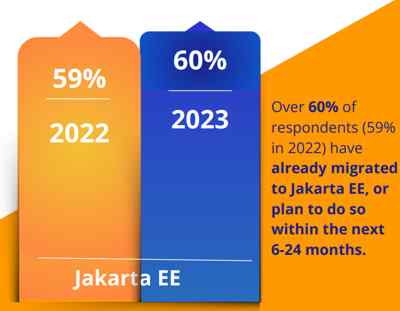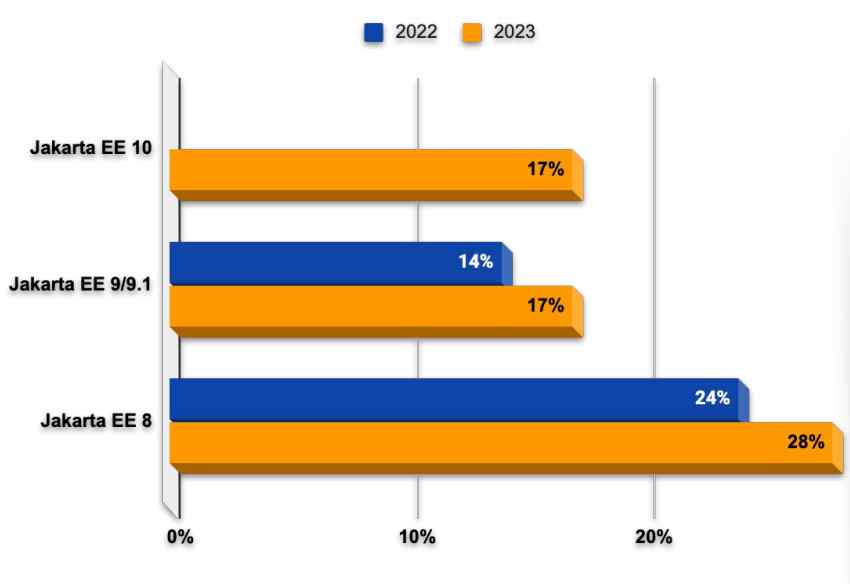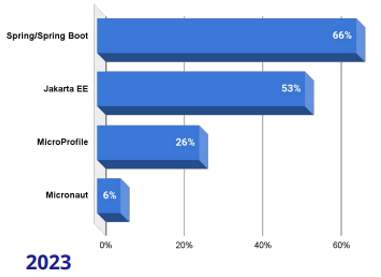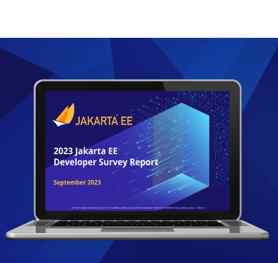| The Eclipse Foundation Releases 2023 Jakarta EE Developer Survey Report |
| Written by Janet Swift |
| Tuesday, 19 September 2023 |
|
The Eclipse Foundation's 2023 Jakarta EE Developer Survey confirmed that Jakarta EE is the basis for the top frameworks used for building cloud native applications. Having shipped in September 2022, Jakarta EE 10 usage had reached 17% by the time of this survey. Formerly known as Java EE, Jakarta EE is a platform for developing enterprise Java applications and a provides a set of specifications for features such as distributed computing, web services, and security. The name change came about after Oracle donated it, in 2017, to the Eclipse Foundation. As an open-source project the community voted to rename the platform Jakarta EE, after the largest city on the island of Java. Now in its sixth year, the Jakarta EE Developer Survey plays a crucial role in providing insight into the needs, preferences, and perspectives of developers within the Java ecosystem. Additionally, it also serves as a valuable resource to help the Java ecosystem better understand the evolving landscape of The 2023 survey was conducted between March 14 to May 23, and had a total of 2,203 participants, over 50% more than the previous edition, which has 1439 responses. The results reveal significantly increased growth in the use of Jakarta EE and a growing interest in cloud native Java overall. Commenting on this finding, Mike Milinkovich, executive director of the Eclipse Foundation said: “2023 has seen the continued growth of cloud native Java, with open source leading the way. The release of Jakarta EE 10 truly opened the doors for this shift, and as we set our sights on Jakarta EE 11 our community is looking to drive innovation for enterprise developers by providing new and enhanced APIs and embracing new features in the Java language and platform.” As in its previous editions, the survey probed the adoption of Jakarta EE reporting that 60% of respondents have already migrated to Jakarta EE, or plan to do so within the next 6-24 months.
The 2023 report states:
It also points to the fact that despite only shipping in September 2022, Jakarta EE 10 usage has grown to 17% whereas 17% of respondents run Jakarta EE 9/9.1 in production (up from 14% in 2022) and 28% currently run Jakarta EE 8 in production (vs 24% in 2022) suggesting that the increase in the migration to Jakarta EE is due to the adoption of Jakarta EE 10. Reporting on the availablity ofJakarta EE 10 in September 2022, Nikos Vaggalis commented: Jakarta EE version 10 is going to be by far the most important update to enterprise Java in the last decade. Last year's Eclipse Foundation's 2021 Jakarta EE Survey revealed the trend of Jakarta departing from the old model of monolithic applications and transitioning to the Cloud, meaning that it facilitates enterprises taking that step forward without having to dump their existing infrastructure. Version 10 turns that into reality, bringing Java up to par with the cloud native era of microservices and containers. Investigating the use of the frameworks used for building cloud native applications, the survey revealed that Spring/Spring Boot, continues to dominate as the leading Java framework for cloud native applications at 66%, up from 57% in 2022. Jakarta EE usage remains steady at 53%, while MicroProfile usage experienced a slight decline dropping from 30% in 2022 to 26% in 2023. The report comments: It’s important to note that Spring/SpringBoot is reliant on Jakarta EE developments for its operation and is not necessarily competitive with Jakarta EE. Both are critical ingredients to the healthy enterprise Java ecosystem. As previously the survey asked about community priorities for Jakarta EE revealing the top three as:
commenting that the top two priorities had remained consistent over the past two years, from 2021 to 2023 while last year’s 3rd place priority “Faster Support from existing Java EE / Jakarta EE or cloud vendors,” had been overtaken by a shift to adapting Java SE innovations and serverless support. The 2023 Jakarta EE Developer Survey Report can be downloaded in its entirety here.
More InformationDownload the report (requires filing a form) Related Articles Dissecting the 2021 Jakarta EE Developer Survey |
| Last Updated ( Tuesday, 19 September 2023 ) |
 This is only a 1% increase over 2022 when 59% of participants used or planned to use it, whereas when we reported on the 2021 edition, see
This is only a 1% increase over 2022 when 59% of participants used or planned to use it, whereas when we reported on the 2021 edition, see 

